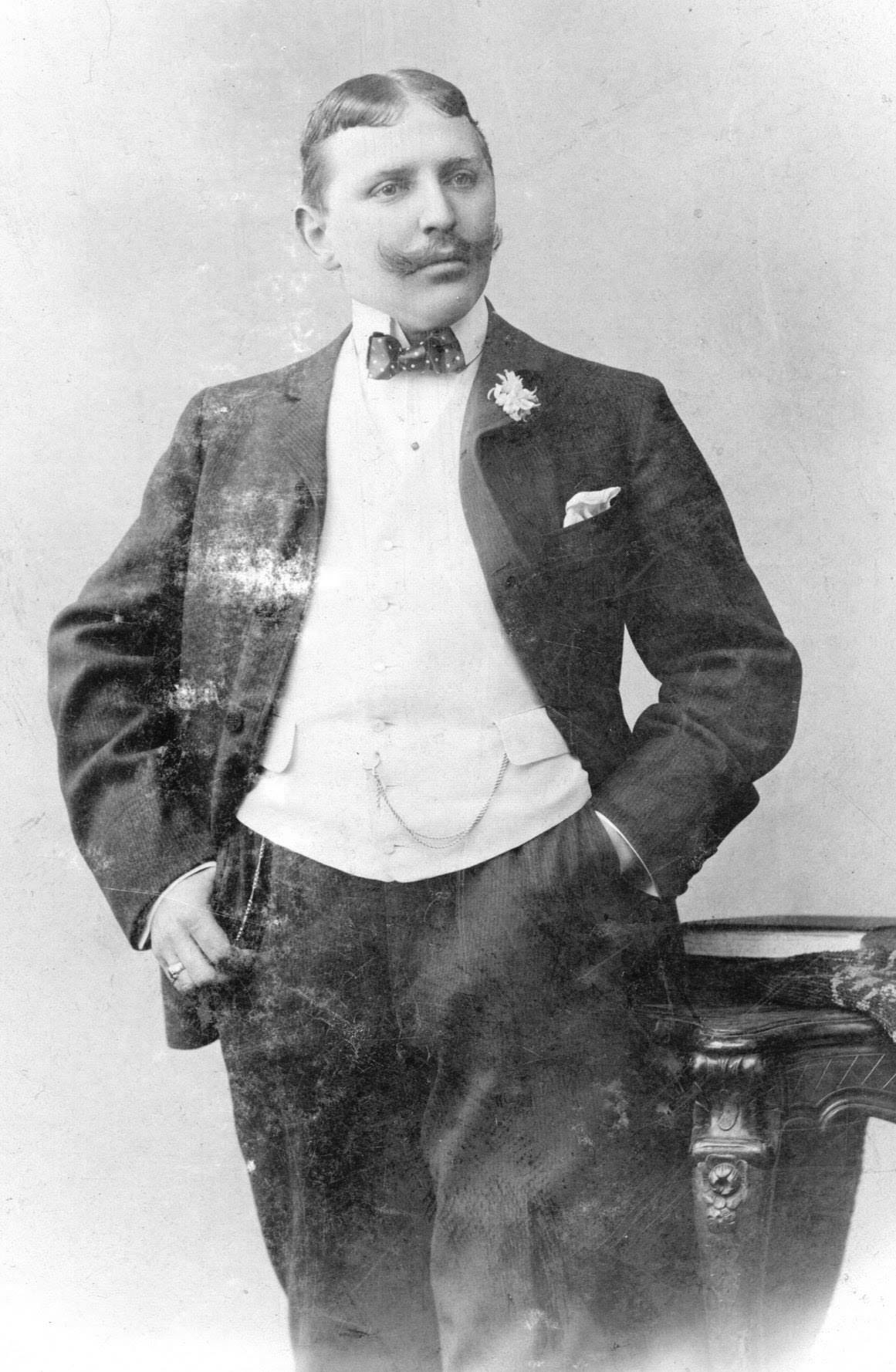Search for Names, Places and Biographies
Already layed Stumbling Stones
Suche
Josef Cohn * 1870
Arnoldstraße 68 (Altona, Ottensen)
HIER WOHNTE
JOSEF COHN
JG. 1870
DEPORTIERT 1943
THERESIENSTADT
ERMORDET 18.1.1944
Josef Cohn, born in Altona on 27 Mar. 1870, deported to Theresienstadt on 24 Mar. 1943, murdered there on 18 Jan. 1944
Arnoldstrasse 68 (Ottensen, Altona)
Josef Cohn was born in Altona on 27 Mar. 1870, the son of Isaac Cohn and Fanny Cohn, née Möller. At that time, the spelling of his name was "Joseph”. In his family he was called "John”.
His father Isaac came from an Altona merchant family that can be traced back two generations. He himself was a "produce dealer” ("Productenhändler”), so presumably he bought agricultural products from farmers and sold them in his store. (Isaac Cohn and his wife Fanny, 13 years his junior, were buried in the Altona Jewish Cemetery on Bornkampsweg, where many relatives are also buried.)
Joseph’s mother Fanny had eight siblings. Her son Josef accordingly enjoyed a large number of aunts, uncles, and cousins. Fanny’s ancestors were natives of Northern Germany. Her paternal great-grandfather – Jesaias Möller – came from the Jewish settlement in Fackenbourg near Lübeck. In the list of Jews living in Altona in 1860, his profession is listed as exterminator. Many of the Möllers were religious leaders in the Jewish Community and were honored accordingly on the gravestones in the Ottensen cemetery. Fanny’s mother Mariane Hirsch came from Kiel. Not much is known about her.
Two addresses of Josef’s family in Altona-Altstadt have been recorded: Breitestraße 145 and Langestraße 84 in 1878.
Josef was the first child of the family. His sister Emma Cohn, married name Weiland (see www.stolpersteine-hamburg.de) followed one year later in 1871, his brother Max in 1872 and his brother Rudolf in 1878. The brothers were circumcised. One may assume that they were brought up along religious principles, as was customary at the time.
On 8 Nov. 1906, at the age of 36, Josef married the non-Jewish baptized Protestant Hulda Emilie Enke from Katzendorf (district of Weimar). His brother Max was his best man. According to the application for welfare assistance, the couple lived as subtenants in a room at Arnoldstraße 68. The marriage remained childless and later, during the Nazi era, it was considered a "non-privileged mixed marriage” ("nicht privilegierte Mischehe”).
Josef’s professional career was full of vicissitudes. He was a trained professional musician. His curriculum vitae also shows that he was a gunner in the Hammonia Landsturm (territorial reserve). Between 1915 and 1918, he worked as a "civil servant’s helper” at the post office in Hamburg. However, in 1931, at the age of 60, he became unfit for work due to poor eyesight. Between 1930 and 1939, Josef was without work. From 1935 to 1939, he and his wife received a disability pension.
In Aug. 1939, his application for continuation of the disability pension was rejected by the Nazis because of the "mixed marriage.” Instead, he was supported from that time onward by the Jewish Religious Organization (Jüdischer Religionsverband), which had become responsible for Jewish welfare recipients by then.
In 1943, he lived at Beneckestraße 2, a "Jews’ house” ("Judenhaus”) that belonged to the Hamburg Jewish Religious Organization. The "Jews’ houses” served the Nazis as collection points for the deportations in 1943. According to the files of the Restitution Office (Amt für Wiedergutmachung), the residents of this house were under particular pressure, because the ground floor apparently accommodated a Gestapo office.
On 24 Mar. 1943, Josef Cohn was deported on Transport VI/5, reaching Theresienstadt on 26 March. Of the 50 people deported, 47 were murdered. These were predominantly Jews not living in "mixed marriages.”
One day after his deportation, on 27 Mar. 1943, the marriage to Hulda was divorced by the Hamburg Regional Court (Landgericht).
Josef Cohn died in Theresienstadt on 18 Jan. 1944, four days before his sister Emma Weiland arrived there. Max had already been deported to Theresienstadt in 1942 and died in the Treblinka extermination camp. Emma returned to Hamburg in June 1945 and, weakened by her imprisonment in the camp, died in Nov. 1945, leaving behind many descendants. Josef’s brother Rudolf Cohn died in 1949.
Josef Cohn’s uncle, Marcus Ruben Cohn, was also a trader. His son Leopold (see corresponding biography) – Josef’s cousin – started a successful wholesale business in grain and animal feed, achieved considerable economic and social success, and became a member of the board of directors of the grain exchange. In Nov. 1938, his company was forced into liquidation. He and his wife Gertrud were deported to Riga-Jungfernhof on 6 Dec. 1941, where they were murdered. The Hamburg Chamber of Commerce has been commemorating him with a Stolperstein at Adolphsplatz 1 (see www.stolpersteine-hamburg.de). Today, his descendants live in New York.
Translator: Erwin Fink/Changes Katrin Holtsteger
Kindly supported by the Hermann Reemtsma Stiftung, Hamburg.
Stand: August 2023
© Katrin Holtsteger
Quellen: StaH, Amt f. Wiedergutmachung, 351-14_1050; 351-11_2481; Jüdische Gemeinden, 522-1/ Hochdeutschen Israelitengemeinde in Altona:; Verzeichnis der israelitischen Einwohner in Altona mit Index (1860); https://www.ancestry.de/ div.; https://collections.arolsen-archives.org/archive/4966714/?p=1&s=cohn,%20josef&doc_id=4966714; http://www.dasjuedischehamburg.de; https://www.hk24.de/share/flipping-book/4188630/index.html#page/12; https://www.holocaust.cz/de/opferdatenbank/opfer/8217-josef-cohn/; https://www.israeliten-luebeck.de/de/juden-von-fackenburg/; https://juedische-geschichte-online.net/thema/familie-und-alltag; http://www.jüdischer-friedhof-altona.de/datenbank.html.


